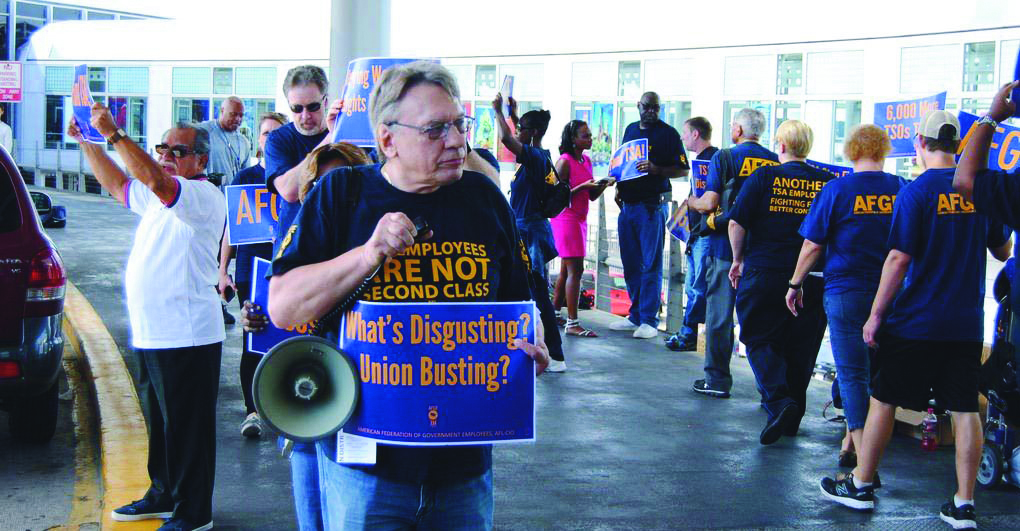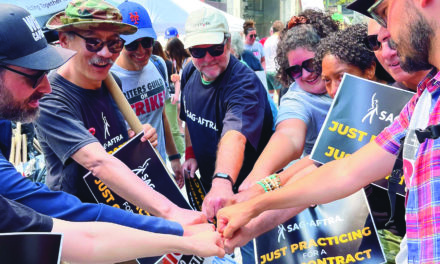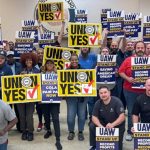From Starbucks and Amazon to GOP Governor Ron DeSantis, union busting has reached new heights.
In Florida, DeSantis has gone after public service employees, signing legislation that prevents dues from being deducted from workers’ pay checks in an effort to quash public service unions.
Members will be required to pay their dues directly rather than having them auto deducted from their pay checks. A move DeSantis and his ilk hope will reduce the number of dues paying union members. The legislation, SB 256, also requires labor unions to determine and report how many eligible employees are dues paying union members, and if that number is fewer than 60 percent of eligible employees, unions will have to be recertified as the collective bargaining agents. As well, the bill allows public service employers to challenge union applications to renew registrations as bargaining agents if the employers think the applications are inaccurate.
AFSCME members, teachers’ unions and other public employee unions in Florida say they are determined to push back against efforts by DeSantis and his anti-worker allies in the legislature.
“Freedom has always been earned from the bottom up,” AFSCME Florida President and AFSCME International Vice President Vicki Hall said in a statement. “That is why we believe the collective voice of workers will overcome SB 256’s goal of silencing Florida’s dedicated public workers by stripping them of their freedom to speak up collectively and their right to join a union.”
## **Starbuck Stalls by Refusing to Bargain Via Zoom **
At Starbucks, the company has failed to negotiate with the union representing some 300 of the 9,000 corporate owned stores. The company has continuously walked out of bargaining sessions when union representatives have joined via zoom rather than in person.
The company is insisting that all bargaining happen in person and has refused to let employees participate virtually.
Company management claim it has the right to demand in-person sessions.
The union, Starbucks Workers United, believes this is yet another stall tactic. In March, Kayla Blado, a spokesperson for the National Labor Relations Board said the company’s refusal to sit at the bargaining table with workers joining remotely is a violation of labor law.
To date, Starbucks has had the most NLRB cases of any private employer. The number of cases is 30 percent more than its closest peer UPS, which has twice the number of employees of Starbucks.
The Senate HELP Committee issued a report that says Starbucks “broke the law 130 times across six states since workers began organizing in fall 2021, including firing or forcing out 12 pro-union workers and firing another two because they cooperated with NLRB investigations.”
The report, which was issued prior to Starbucks former CEO Howard Schultz’s testimony to the committee in late March, documented a series of misleading claims made by Starbucks to “set the record straight and to encourage the company to negotiate a fair first contract with union workers as required by law.”
## **NLRB Accuses Amazon of Illegally Firing Pro-Union Workers**
Amazon has a slew of federal labor board allegations that it illegally refused to bargain with the union representing workers at a New York City warehouse, fired a union leader, restricted union access to its facilities, and committed other unfair labor practices.
March 31 marked one year since the Staten Island warehouse employees voted to join the Amazon Labor Union. Since then, the fight has been an uphill battle. Immediately after the election, the company filed more than two dozen formal objections to the results, which tied the union up in hearings well into last summer. The company has continued to use delay tactics and the courts to stifle the progress of negotiating.
The NLRB has even accused Amazon CEO Andy Jassy of illegally coercing and intimidating workers by telling them they would be “less empowered” if they unionized.
Of course, Amazon denies all allegations of union busting.
## **Employers Use Stall Tactics to Bust Unions**
According to a 2008 study from Desautels Professor John-Paul Ferguson, union election victories resulted in first contracts only 56.3 percent of the time. Ferguson says, “it is even harder now. Employers are treating union’s success in a NLRB election as just another setback.”
In a 2022 HELP committee hearing, Senator Tim Kaine (D-VA) cited data from Bloomberg Law’s labor database that showed the time it takes to negotiate a first contract has increased from an average of 409 days to now an average of 465 days—more than a year.
Many in the labor community believe the reason for the long delays is obvious. “A lack of progress in bargaining can dissuade workers from unionizing, by conveying the sense that it’s futile even when you win the recognition election,” says Terri Gerstein, Senior Fellow at the Economic Policy Institute.
Another reason union negotiators believe companies stall negotiations is that, under U.S. labor law, a union cannot be decertified until after a year. If during that first year, no progress is made on negotiating a contract, the union members may become dissatisfied with union and vote to decertify. This tactic works because union members see no benefit to unionization when they don’t have a contract in place.
What’s Disgusting? Union Busting








WHAT’S DISGUSTING? REPUKEIKINS UNION BUSTING!!!!